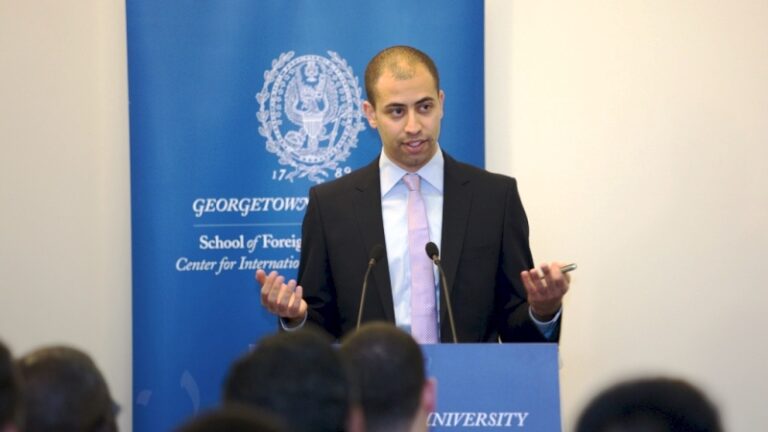Dialogue Series, Distingushed Lectures, Regional Studies
Abdullah Al-Arian Lectures on the Muslim Brotherhood

Abdullah Al-Arian, Assistant Professor of History at the Georgetown University School of Foreign Service in Qatar, delivered a CIRS Monthly Dialogue lecture titled “From Revolution to Coup: Egypt and the Muslim Brotherhood” on October 7, 2013.
Testament to Egypt’s importance in the Arab World, he argued that “whatever happens in Egypt has a tremendous impact on the outcomes of movements across the entire region. We are already seeing the consequence of that in places like Tunisia, Syria, Palestine, and elsewhere.” To this effect, Al-Arian addressed three areas: first, he traced the trajectory of the Muslim Brotherhood over the last four decades of its history. Second, he evaluated how that history shaped the decisions and performance of the Muslim Brotherhood over the course of the last few years in Egypt. Finally, he ventured some possible scenarios for the future of the Brotherhood, and its place in Egyptian politics and society.
Giving some background to the institution of the group, Al-Arian noted that despite having been formed eighty-five years ago by Hassan Al-Banna, it experienced very few ideological or organizational shifts over the years. During the presidency of Anwar Sadat in the 1970s, Egypt began a new era in which formative economic and political liberalizations were taking place, shifting power away from the military and towards a new urban middle-class. The Brotherhood’s traditional support-base existed in rural Egypt, but “during the course of its reconstitution, the organization’s veteran leadership tapped into this emerging social group that was increasingly urbanized, middle-class, professional, and, to a certain extent, more religiously devout due in large part to disenchantment or disillusionment with the failures of the Nasser period,” he argued. The group entered into a modern phase of its history where Islamic activism was coupled with practical concerns, and economic prowess. At this time, the Brotherhood worked on streamlining its message in order to overcome an increasingly fragmented sense of Islamic identity, and to challenge the rise of competing movements that attempted to fill the void of post-colonial power struggles. During this phase of its history, “the Muslim Brotherhood is slowly beginning to engage more directly with society and, to a certain extent as well, with the state,” he explained.
Seeking to protect their vested interest, and not wanting to jeopardize the tacit agreements forged with the Mubarak regime over the years, the Brotherhood acted cautiously when it came to overt political engagement, and remained on the margins of the 2011 uprisings. Al-Arian suggested that “It’s not a revolutionary movement, it’s a reform movement,” which is exemplified by the group’s reticence to join the civil society uprisings in Egypt at the early stages of unrest. “It was only three days later, when the momentum was clearly picking up that finally the leadership reverses its decision and decides to flood Tahrir Square with its supporters who, of course, played a very critical role in the biggest clashes between them and Mubarak’s security agents,” he said. After the fall of the Mubarak regime, “the Muslim Brotherhood along with millions of other Egyptians faced a very critical choice: do they support the transition to a new government that was basically being put in place by the military, or do they demand true revolutionary change by opposing all attempts by the military to try to impose its roadmap for the ensuing transition?” When Muslim Brotherhood candidate Mohamed Morsi took office, despite a few token gestures to appease the public, he made no major changes to the existing mode of governance. In fact, “the most critical institutions—the bureaucracy, the judiciary, the police, the intelligence services, and most major ministries—would essentially continue to function with a ‘business-as-usual’ attitude, with only cosmetic changes being made,” Al-Arian noted.
Although the Brotherhood had a successful history of organizing grassroots civil institutions at the community level, the group lacked any form of expertise when it came to large-scale economic and political proficiency necessary for the functioning of an entire nation. Thus, during their time in office, the Brotherhood submitted to the entrenched authoritarian hold of the army ensuring that it remain beyond recrimination despite the abuses committed during the uprisings, and that it would not be held accountable despite its undemocratic and opaque modes of operation. Ultimately, allowing the military to continue its control would be the group’s undoing as “the Muslim Brotherhood was actually helping to create the climate in which a freely elected president could be overthrown by the defense minister and head of the military,” he contended.
In conclusion, Al-Arian argued that, after a brief moment in charge, the Muslim Brotherhood has once again become an ostracized entity whose leaders have been imprisoned, their institutions destroyed, their assets seized, and their media shut down. As a final thought, however, he posited that “an unintended consequence of the state’s desire to destroy the Muslim Brotherhood will actually enable the development of alternative modes of organization and mobilization by the remnants of the Muslim Brotherhood, with a particular emphasis on the youth generation.”
Abdullah Al-Arian holds a doctorate in history from Georgetown University, where he wrote his dissertation on the Muslim Brotherhood in Egypt during the decade of the 1970s. He received his Masters degree from the London School of Economics and his BA from Duke University. A frequent contributor to the Al-Jazeera English network and website, Al-Arian is the author of the upcoming book Answering the Call: Popular Islamic Activism in Egypt, 1968-1981, to be published by Oxford University Press early next spring.Article by Suzi Mirgani, Manager and Editor for CIRS Publications.